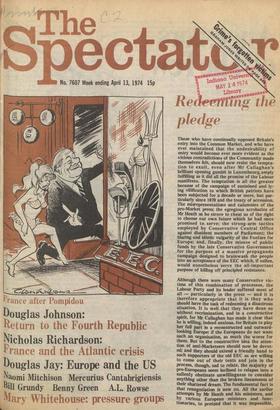jeternitrillgi he pledge Those who have continually opposed Britain's entry
into the Common Market, and who have ever maintained that the undesirability of entry would become ever more evident as the vicious contradictions of the Community made themselves felt, should now resist the temptation to exult, even after Mr Callaghan's brilliant opening gambit in Luxembourg, amply fulfilling as it did all the promise of the Labour manifesto. The temptation is all the greater because of the campaign of sustained and lying vilification to which British patriots have been subjected for a decade or more, but particularly since 1970 and the treaty of accession. The misrepresentations and calumnies of the pro-Market press; the egregious acrobatics of Mr Heath as he strove to cheat us of the right to choose our own future which he had once promised to. serve; the strong-arm tactics employed by Conservative Central Office against dissident members of Parliament; the blaring and idiotic vulgarity of the Fanfare for Europe; and, finally, the misuse of public funds by the late Conservative Government for the purpose of a massive propaganda campaign designed to brainwash the people into an acceptance of the EEC which, if sullen, would nonetheless serve the all-important purpose of killing off principled resistance.
Although there were many Conservative victims of this combination of processes, the Labour Party and its leader suffered most of all — particularly in the press — and it is therefore appropriate that it is they who should have the task of redeeming a disastrous situation. It is well that they have done so without recrimination, and in a constructive spirit, for Mr Callaghan has made it clear that he is willing, indeed anxious, for Britain to play her full part in a reconstructed and outwardlooking Europe: if the Europeans do not want such an organisation, so much the worse for them. But to the constructive idea the attention of anti-Marketeers should now be devoted; and they should extend a friendly hand to such supporters of the old EEC as are willing to come out of their tents and join in the process, though, sad to relate, the majority of pro-Europeans seem inclined to relapse into a sullenly obstinate unwillingness to consider anything other than the broken lineaments of their shattered dream. The fundamental fact is that renegotiation is now on. All the earlier attempts by Mr Heath and his ministers, and by various European ministers and functionaries, to pretend that it was impossible, that the treaty of accession was by way of being an unbreakable, an unvariable, compact, that the European powers would turn down any such proposal out of hand — all these are now swept aside, as Europe waits to hear Mr Callaghan's proposals.
It is absolutely essential that the movement towards the political integration of Europe Should be brought to an end. It is hardly likely to be necessary vindictively to demand the abolition of the so-called Parliament at Strasbourg, since it is scarcely a matter of the first Priority to deny their fun to those who like to go there. But there must be a clear stand against economic and monetary integration, and a curb put on the power of the Brussels Commission to issue binding regulations. Nor Will it do for extra powers to be given to the Westminster Parliament: these, after all, might be taken away again by a subsequent Conservative administration. The matter must be dealt with at the roots, by altering the constitution of the Commission. Further, the economic and financial balance of the EEC must be profoundly altered. If this involves the total abolition of the Common Agricultural Policy, then the EEC will probably have to break up. But it may be possible to devise a Common Industrial Policy, participation in Which would benefit Britain and compensate her for the CAP. Alternatively, a hierarchy of association might be constructed in which Britain, while participating fully in the foreign Policy counsels of the European powers, might Opt out of the more burdensome economic Commitments, and seek much of her trade elsewhere, while those who felt like subsidising the French, Irish and Danes (all of whom gain most from CAP) could continue to do so. Plainly, lithe European powers abandon their Present obduracy in the face of facts, exciting Possibilities could lie ahead for an association between European countries in which the sovereignty of each would be respected. Only by standing more firmly than has any recent British government for an enlightened definition of the national interest can Mr Wilson and IV.1[r Callaghan hope to bring such a combination about.



































